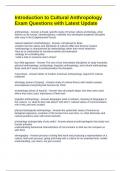Introduction to Cultural Anthropology
Exam Questions with Latest Update
anthropology - Answer-a broad, specific study of human culture and biology, what
defines us as human, interdisciplinary, relatively new developed academic discipline
with roots in the Enlightenment Period
cultural relativism (methodology) - Answer--introduced by Boas
-position that the values and standards of cultures differ and deserve respect
-anthropology is characterized by methodology rather than moral relativism
-they try to understand its members beliefs and motivation
-strategy for controlling bias
-"walk a mile in someone else's shoes"
four-field approach - Answer-The use of four interrelated disciplines to study humanity:
physical anthropology, archaeology, linguistic anthropology, and cultural anthropology
Boas used all 4 areas to professionalize the discipline
Franz Boas - Answer-father of modern American anthropology; argued for cultural
relativism
ethnology (areas of inquiry) - Answer-study of cultural theory with modern people,
encompasses everything that humans do, think
archaeology (areas of inquiry) - Answer-how do people adapt, how they were used,
where they were used, importance of field work
linguistic anthropology - Answer-languages used in cultures, meaning of languages in
the context, i.e. what do they talk about? with who?, cultural values of communication,
role of etic and emic studies
physical (biological) anthropology - Answer-the systematic study of humans as
biological organisms, evolution of the human form over time, i.e. Wari Mummies and
cultural practices seen with burial methods
primatology (subspecialty of phy anth) - Answer-physical anthropologists that study non-
human primates
understanding behavioral characteristics of non-humans so that we can compare us
with them
ethnography - Answer-process of doing field work and producing a representation of a
culture, field work process, going and living with a culture for an extended time, insider
understanding, can return, not just a tourist
, emic and etic data - Answer-etic is phonetic, emic is phonemic; etic is the formal aspect
of language while emic is the meaning of these sounds
participant observation - Answer-observing as a part of their routine to a degree, as a
"marginal native"
longitudinal research and its value - Answer-long-term research, not just taking a
snapshot, doing your research over a long period of time, culture change over time
ethnologist as "marginal insider" - Answer-emic knowledge, dual perspective &
comparative viewpoint. To have native-like knowledge
culture shock and its role in fieldwork - Answer-culture shock forces an ethnographer
into a meaning confrontation, forced to deal with that problem, participant observation
forces you to experience cultural shock
qualitative approach (subjective data) - Answer-patterns, behaviors, language and
underlying meanings
quantitative approach/data - Answer-survey or questionnaire, this is statistical/numerical
data; not likely to get a good understanding from this data alone, census data
AAA Code of Ethics: protection of informants, forbids undercover research - Answer-- If
you were studying an informant and their respective culture, in the instance where
something happened where he/she was in danger and furthering the research would
harm them, then you had to drop the research and go back home
- Undercover research is forbidden, meaning that the informant has to know exactly
what you are doing and why you are studying their culture, no one can go in undercover
and interview people, they must be informed
ethnography of a sectarian colony (Nueva Jerusalem) - Answer-value of the life history
method, limitations of participation in sectarian contexts, sectarian
colony, millenarian
- Michoacan state
- Millenarian sectarian colony
- Virgin Mary appeared and talked about the end of the world
- They consider themselves an extension of heaven
- They want to rebuild the catholic church
informant (consultant) - Answer-person who is knowledgable of some aspects of the
area in which you are studying/specializing in
key consultant - Answer-people who have a deep take on a culture you are studying,
and is knowledgable on some aspects, such as knowing the history, specialization in
genealogy, etc. these people can also be gatekeepers!




